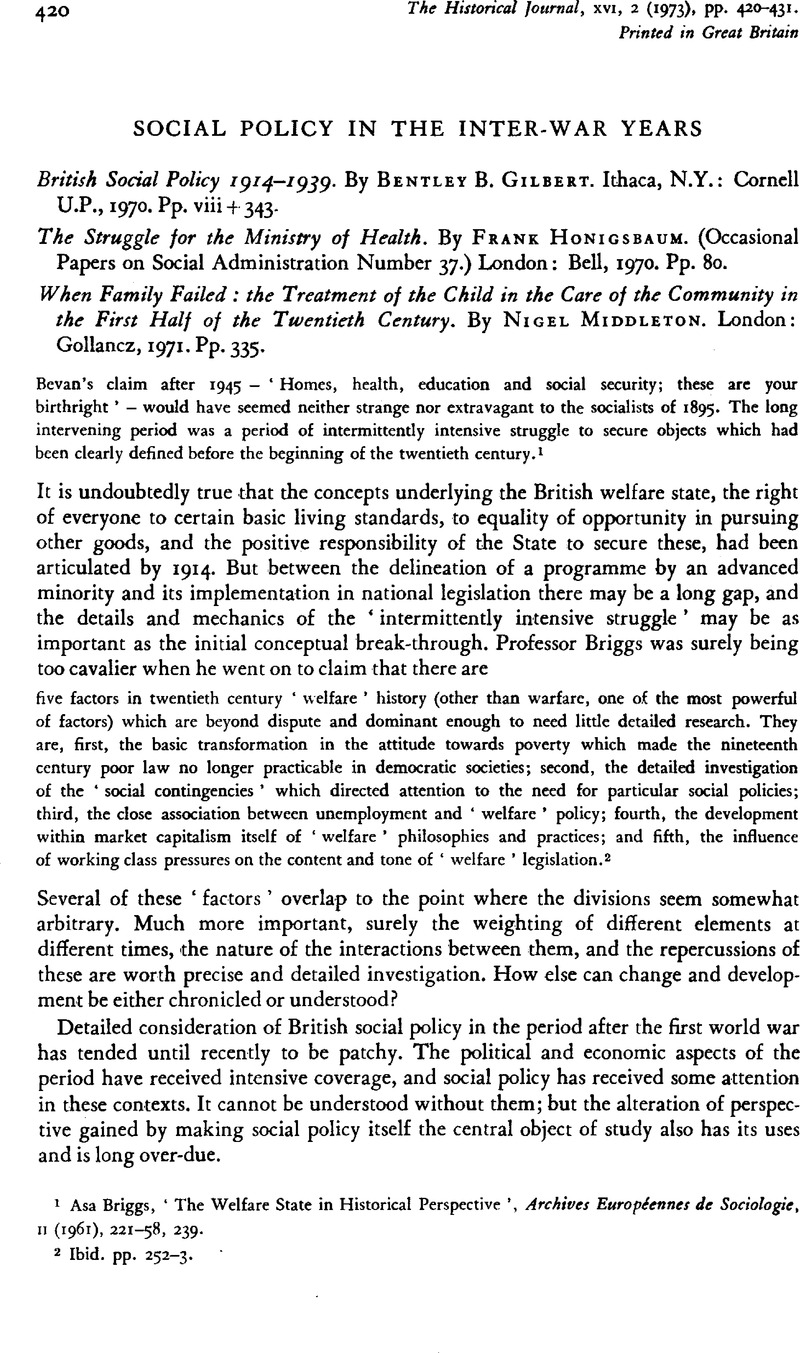Article contents
Social Policy in the Inter-War Years
Published online by Cambridge University Press: 11 February 2009
Abstract

- Type
- Review Articles
- Information
- Copyright
- Copyright © Cambridge University Press 1973
References
1 Briggs, Asa, ‘The Welfare State in Historical Perspective’, Archives Européennes de Sociologie, ii (1961), 221–58, 239.CrossRefGoogle Scholar
2 Ibid. pp. 252–3.
3 London, 1962.
4 See my Policy-Making in Elementary Education 1870–1895 (OUP, forthcoming).
5 Barker, Rodney, Education and Politics 1900–1951. A Study of the Labour Party (Oxford, 1973), pp. 48–56.Google Scholar
6 For one example of local initiative, see Seaborne, Malcolm, ‘William Brockington Director of Education for Leicestershire 1903–1947’, Education in Leicestershire 1540–1940, Simon, Brian (ed.) (Leicester, 1968), pp. 195–224.Google Scholar
7 Barker, ; Olive Banks, Parity and Prestige in English Secondary Education (London, 1955).Google Scholar
8 History of the Second World War, United Kingdom Civil Series (London, 1950).Google Scholar
9 Essays on ‘the Welfare State (London, paperback edn, 1963), pp. 75–87.Google Scholar
10 Past and Present, xxiv (04 1963), 43–64.Google Scholar See also Andreski, S. and Abrams, Philip, ‘The Military Participation Ratio’, Past and Present, xxvi (04 1964), 113–14.Google Scholar
11 Orwell, Sonia and Angus, Ian (eds.), The Collected Essays, Journalism and Letters of George Orwell (4 vols., London, 1968), i, 505.Google Scholar For an especially poignant account of the experience of this dislocation, see Brittain, Vera, Testament of Youth (London, 1st edn, 1936).Google Scholar
Interestingly Orwell saw the second world war as much less divisive, because blitzkrieg involved the whole population, old as well as young, as never before. But for the same reason the experience was the more overwhelming and initially he cherished real hopes of a social revolution. His ‘London Letters’ for Partisan Review, reprinted in vols. ii and iii of the Collected Essays, chart his hopes and the gradual process of disillusionment.
12 London, 1966.
13 Lambert, R. J., Sir John Simon and English Social Administration 1816–1904 (London, 1963).Google Scholar
14 On the bureaucratization of the civil service, see Sutherland, Gillian (ed.), Studies in the Growth of Nineteenth-Century Government (London, 1973), esp. pp. 8–10. Morant still awaits a proper biography.Google Scholar
15 Hodgkinson, Ruth G., The Origins of the National Health Service: The Medical Services of the New Poor Law 1834–1871 (London, 1967);Google ScholarMacLeod, Roy M., Treasury Control and Social Administration: A Study of Establishment Growth at the Local Government Board 1871–1905 (London, 1968).Google Scholar
16 Compare Honigsbaum, esp. pp. 32–3 and 44–54 with Brand, Jeanne L., Doctors and the State: The British Medical Profession and Government Action in Public Health 1870–1912 (Baltimore, 1965),Google Scholar ch. xi and Eckstein, Harry, Pressure Group Politics (London, 1960).Google Scholar
17 Quoted in Gilbert, p. 5.
18 Douglas, Roy, ‘The background to the “Coupon” election arrangements’, English Historical Review, LXXXVI (04 1971), 318–36.CrossRefGoogle Scholar
19 For a discussion of this, see Harris, José, Unemployment and Politics, A Study in English Social Policy, 1886–1914 (Oxford, 1973), pp. 343–6. We may speculate whether the Commission would have done as little as it did, had Lloyd George stuck to his original intention of offering Morant the chairmanship.Google Scholar
20 Quoted in Gilbert, p. 20.
21 As Walter Kendall points out, the militants maintained a quite artificial separation between industrial and political action’ – The Revolutionary Movement in Britain 1900–21 (London, 1969), p. 293.Google Scholar
22 For the restricted nature of the franchise under the Third Reform Act, see Blewett, Neal, ‘The Franchise in the United Kingdom 1885–1918’, Past and Present, XXXII (12 1965), 27–56.CrossRefGoogle Scholar
23 Quoted in Gilbert, p. 58.
24 For detailed discussions of Labour and Conservative thinking, see Skidelsky, Robert, Politicians and the Slump. The Labour Government of 1929–1931 (London, 1967),Google Scholar and Middlemas, Keith and Barnes, John, Baldwin (London, 1969), esp. chs. xvii and xxv.Google Scholar
25 London, 1945.
26 Quoted in Wohl, A. S., ‘The Housing of the Working Classes in London 1815–1914’, The History of Wording-class Housing, Chapman, Stanley D. (ed.) (Newton Abbot, 1971). P. 38.Google Scholar
27 Quoted in Gilbert, p. 147.
28 For a detailed analysis, see Bowley, pp. 100–13.
- 2
- Cited by




